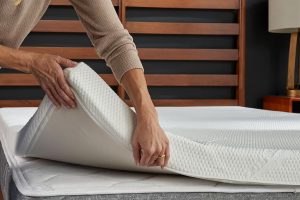When it comes to a restful night’s sleep, the role of your mattress is undeniable. However, the often-overlooked companion in this equation is the pillow. Just as your mattress supports your body, your pillow supports your head and neck, and the perfect pillow can make all the difference in achieving a comfortable and rejuvenating slumber. In this article, we’ll engage in some “pillow talk” to help you find the ideal pillow that complements your mattress for a blissful night’s rest.
1. Sleeping Position Matters
Your preferred sleeping position is a significant factor in determining the right pillow for you:
- Back Sleepers: Back sleepers generally benefit from a pillow with medium support. Look for a pillow that maintains the natural curve of your neck and supports your head without being too high.
- Side Sleepers: Side sleepers need a firmer, higher loft pillow to keep their head and neck aligned with their spine. This type of pillow provides the necessary support for your head to sink into the pillow comfortably.
- Stomach Sleepers: Stomach sleepers typically require a thinner, softer pillow to prevent their neck from being strained by excessive elevation.
2. Pillow Material
Pillows come in a variety of materials, each with its unique properties:
- Memory Foam: Memory foam pillows conform to the shape of your head and neck, offering excellent support and pressure relief. They are a great choice for those who prefer a supportive yet plush surface.
- Latex: Latex pillows are durable, hypoallergenic, and provide a responsive and supportive surface. They are particularly suitable for those seeking a supportive and hypoallergenic option.
- Feather and Down: Feather and down pillows are soft and lightweight, providing a cloud-like feel. They require fluffing to maintain their loft.
- Synthetic Fill: Synthetic fill pillows are a budget-friendly option, offering a balance of comfort and support. They are easy to maintain and often hypoallergenic.
- Specialized Pillows: There are pillows designed for specific needs, such as contour pillows for neck pain relief, cooling pillows for temperature regulation, and anti-snore pillows for better breathing during sleep.
3. Pillow Loft
The loft, or thickness, of a pillow plays a crucial role in your comfort. A pillow’s loft should complement the firmness of your mattress:
- Firmer Mattress: If you have a firmer mattress, a higher loft pillow can help fill the space between your head and the mattress, ensuring proper alignment.
- Softer Mattress: A softer mattress often pairs well with a lower loft pillow to prevent your head from sinking too deeply.
4. Allergies and Hygiene
Consider hypoallergenic options if you have allergies. Look for pillows with materials that resist dust mites and allergens, such as latex or synthetic fills. It’s also important to choose pillows with removable, washable covers for easy cleaning and maintenance.
5. Personal Preference
Ultimately, the perfect pillow is a matter of personal preference. Some people prefer a soft and fluffy pillow, while others opt for a firmer and more supportive one. Take your time to test different pillows and choose the one that feels the most comfortable and supportive to you.
Conclusion
Just as a mattress provides the foundation for your sleep, a pillow completes the equation by offering the essential support for your head and neck. By considering your sleeping position, pillow material, loft, allergies, and personal preferences, you can find the perfect pillow to complement your mattress, ensuring a luxurious and restful night’s sleep. So, engage in some “pillow talk” with your preferences and select the ideal pillow that promises nights of uninterrupted slumber and waking up feeling refreshed.















Add Comment